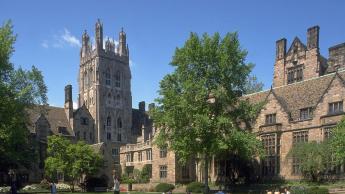Related Topics
Academia in the Philadelphia Region
Higher education is a source of pride, progress, and aggravation.
Robert H.Bork Upsets A Century of Antitrust Law
According to the late Robert H. Bork, it ought to be fairly easy to identify price-fixing, because legitimate cases that harm the consumer by price manipulation aren't common, or may not even exist. With this, Bork convinced the judiciary to abandon a century of contrary belief while still a young law professor, thus establishing his own reputation with Ronald Reagan. He was appointed Solicitor General by Richard Nixon, unfortunately thus embroiling himself in Nixon's impeachment.
Yale Blue

|
| Yale |
When a college applicant recently asked me what was so good about Yale, the question was so unexpected it took a moment to find a graceful answer. What finally occurred to me was the battle cry of New Orleans, before Hurricane Katrina. "It is impossible to find a bad meal in New Orleans." In culinary matters, New Orleans had a deep bench; with everybody in the city interested in good cooking, even the most dilapidated diner would serve you something rather good.
Well, in 1940 at least, it was impossible to take a course in Yale College that wasn't stimulating, taught by a distinguished professor who was charming and likable. At one point, I wandered into a course in early 19th Century English Literature, taught by William DeVane, a courtly and urbane gentleman who happened to be Dean of Yale College. Yale College refers to those who are seeking a B.A. degree; those taking a B.S. degree are said to be part of the Sheffield Scientific School; a few others were going to be engineers. In retrospect, I suppose Bill DeVane was just having fun teaching a course, possibly satisfying himself that Yale College was still working the way he wanted it to. In any event, I certainly didn't take that course because I cared who was Dean, or who DeVane was. I just thought it would be interesting to take a course in Jane Austen, Charles Dickens and some other early Victorian novelists. I'm glad I took that course, but I would have been just as glad if the topic had been the history of the Civil War, or a dozen other things. Except then I would have missed the experience of being close to DeVane, whom I now imagine was the architect of modern Yale College. The essence of this is that a Yale College student could select a course in any subject that caught his fancy and be confident it would be first-rate. Essentially invisible to me at the time was the absence of certain courses for the main reason there was no one outstanding who was available to teach that subject. If some topic was so central that a course just had to be taught, Shakespeare for example, I suspect the Dean or the President would have found money no obstacle to getting someone outstanding to teach it. Meanwhile, as long as you wandered around inside the printed course catalog, you would need no particular guidance. The faculty obviously enjoyed the students, quite often coming to lunch at student tables in the various residential colleges. For example, William Lyon "Billy" Phelps usually arrived early, and Branford students would fight to sit at his table. At least in those days, the students liked the faculty, and the faculty liked to be with the students.
That sounds like quite a contrast with what is rumored at other colleges today, although it's hard to be sure of comparisons across several decades. Perhaps it was the student rebellions of the sixties, long hair, a fashion of crude speech, and all the other features of the social revolution that started during the summer of love. Perhaps it was the demographic bulge with attendant overcrowding of campus and classroom. And perhaps it was never as idyllic as I remember; my classmate Bill Buckley certainly believed we were at the mercy of godless secularism marching in academic lockstep, although I don't remember anyone else agreeing with him. Today, so many people agree with Buckley's viewpoint that it's hard to assess. But there is little dispute that graduate students never taught undergraduate courses in my day, any lecture that I remember had more than fifty students in the class, no one would have been admitted to class without a tie and jacket, everyone addressed the faculty as "Sir". No one went to Europe in Junior Year, so there was no suspicion that extra tuition for decreased teaching was an administrative goal. Even if there had been a Junior Year Abroad, I wouldn't have taken it because there were so many neat courses in New Haven that seemed more attractive. There were no illicit drugs to worry about, and girls only arrived on the train for special occasions. Yes, there were some beer-drinking playboys, but it was plain to see they would soon flunk out.
Originally published: Thursday, June 22, 2006; most-recently modified: Wednesday, August 07, 2019